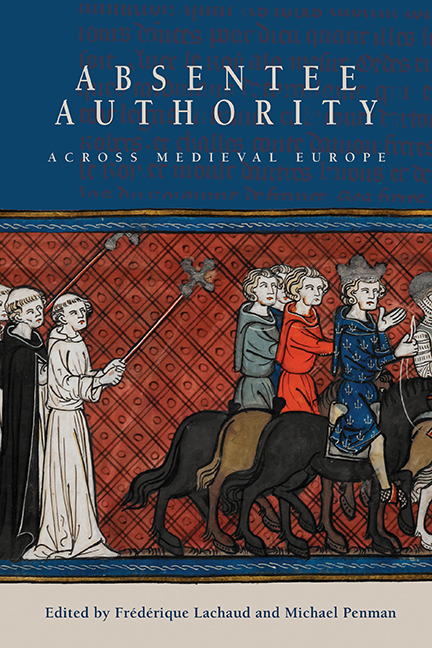Book contents
- Frontmatter
- Contents
- List of Illustrations
- List of Contributors
- Acknowledgements
- List of Abbreviations
- Introduction: Absentee Authority across Medieval Europe
- 1 Incarnating Authority, Exercising Authority: The Figure of the King in the Merovingian Era
- 2 ‘Ubi armae ibi princeps’: Medieval Emblematics as the Real Presence of the Prince
- 3 While the Bishop's Away …: Absentee Bishops of Parma during the Investiture Contest
- 4 An Inconceivable Absence: Usurpers and Illegitimate Rulers in the Genealogical Rolls of the Kings of England, from the Late Thirteenth to the Early Fifteenth Centuries
- 5 Local Loyalty and Absentee Authority in Thirteenth-Century Normandy: The Evidence of the Querimoniae Normannorum (1247)
- 6 Representation and Authority in Thirteenth-Century England and Gascony
- 7 Internal Exiles: Exclusion from the Fourteenth-Century English Court and Kingdom
- 8 ‘Si grant charté a Paris … par defaulté du roy’: Governmental Practice and the Customary Geography of the Absence and Presence of the King in France (1364–1525)
- 9 Was the Couple a Palliative to the Absence of the Prince? The Political Role and Influence of Margaret of Flanders during the Reign of Philip the Bold, Duke and Count of Burgundy (1384–1404)
- 10 Guardian – Lieutenant – Governor: Absentee Monarchy and Proxy Power in Scotland's Long Fourteenth Century
- 11 Absentee Authority in Late Medieval Iceland, as Viewed from the Literary Sources
- 12 Representatives of Kings and ‘Kings’ as Representatives: Authority and its Representation in Professional Groups in Late Medieval and Early Modern France – the Example of the King of Minstrels and of the King of Mercers
- Index
Introduction: Absentee Authority across Medieval Europe
Published online by Cambridge University Press: 16 May 2018
- Frontmatter
- Contents
- List of Illustrations
- List of Contributors
- Acknowledgements
- List of Abbreviations
- Introduction: Absentee Authority across Medieval Europe
- 1 Incarnating Authority, Exercising Authority: The Figure of the King in the Merovingian Era
- 2 ‘Ubi armae ibi princeps’: Medieval Emblematics as the Real Presence of the Prince
- 3 While the Bishop's Away …: Absentee Bishops of Parma during the Investiture Contest
- 4 An Inconceivable Absence: Usurpers and Illegitimate Rulers in the Genealogical Rolls of the Kings of England, from the Late Thirteenth to the Early Fifteenth Centuries
- 5 Local Loyalty and Absentee Authority in Thirteenth-Century Normandy: The Evidence of the Querimoniae Normannorum (1247)
- 6 Representation and Authority in Thirteenth-Century England and Gascony
- 7 Internal Exiles: Exclusion from the Fourteenth-Century English Court and Kingdom
- 8 ‘Si grant charté a Paris … par defaulté du roy’: Governmental Practice and the Customary Geography of the Absence and Presence of the King in France (1364–1525)
- 9 Was the Couple a Palliative to the Absence of the Prince? The Political Role and Influence of Margaret of Flanders during the Reign of Philip the Bold, Duke and Count of Burgundy (1384–1404)
- 10 Guardian – Lieutenant – Governor: Absentee Monarchy and Proxy Power in Scotland's Long Fourteenth Century
- 11 Absentee Authority in Late Medieval Iceland, as Viewed from the Literary Sources
- 12 Representatives of Kings and ‘Kings’ as Representatives: Authority and its Representation in Professional Groups in Late Medieval and Early Modern France – the Example of the King of Minstrels and of the King of Mercers
- Index
Summary
Across medieval Europe, the distinction between authority (auctoritas or dignitas) and power (potestas) was at the heart of the theoretical reflection on powers, most especially in the form of the division between ecclesiastical authority and temporal power, inherited from Pope Gelasius. An alternative analysis distinguished implicitly between the power and authority held by the prince, and various forms of delegated power: in practice, lords or their representatives exerted power over localities and/or populations, but their legitimacy rested on the authority of a distant prince. In the case of kings, the personal nature of kingship raised specific questions about the continuity of authority and the risks created by the king's absence, incapacity or death. The growing separation between the person of the king and the dignity of the Crown may have helped resolve this issue. In England, the Boulogne Agreement of 31 January 1308 is usually considered as the first textual evidence of the clear separation between the Crown and the person of the king. However, earlier texts had already enhanced the perennial nature of the royal dignitas.
In fact, there were many instances when authority of various ranks and forms was absent: through legal minority, vacancy or physical or mental incapacity; under duress (by captivity or exile); or through conscious choice due to a plurality of business commitments or priorities beyond the physical jurisdiction of the individual(s) in power. These absences were experienced in various ways, and prompted a variety of responses. We might, of course, identify common legal principles and customs which evolved over time to respond to such crises or interregna, and to guide the appointment and management of proxy authority in ruling dynasties and governments, national and trans-national institutions (such as characterized both the secular and regular churches), and thus communities small and large (from individual households, families and businesses through wider associations such as guilds and on to towns and city states). However, given the huge variety of experiences across the many kingdoms, lordships and institutions of medieval Europe which have been highlighted by recent collaborative surveys of similar themes – such as hereditary succession or the development of office-holding and representative assembly – the editors of this present volume chose, quite deliberately, to set no very fixed parameters in inviting contributions which reflected as wide a geographical, socio-political and methodological spectrum as possible.
- Type
- Chapter
- Information
- Absentee Authority across Medieval Europe , pp. 1 - 20Publisher: Boydell & BrewerPrint publication year: 2017



